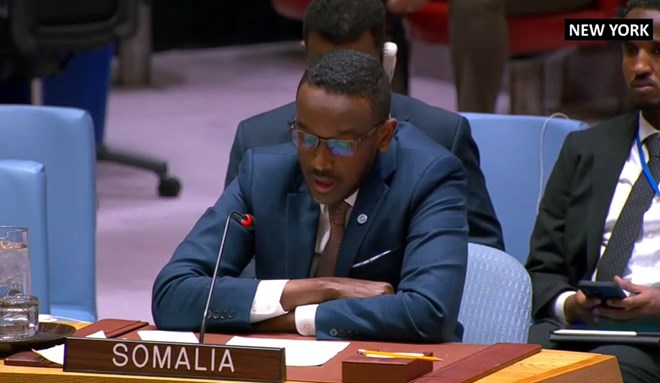
Saturday December 28, 2024

Mogadishu (HOL) — The United Nations Security Council has approved the African Union Support and Stabilization Mission in Somalia (AUSSOM), marking a shift in Somalia's security landscape as the country takes greater control over its stability. Resolution 2767 (2024), adopted with 14 votes in favour and one abstention by the United States, replaces the African Union Transition Mission in Somalia (ATMIS). This new mission is set to begin in January 2025, with operations concluding by June 2025.
AUSSOM will deploy up to 12,626 personnel, including 1,040 police officers, under a 12-month mandate to assist Somalia's security forces in countering Al-Shabaab and other terrorist threats. The Somali government emphasized that its bilateral agreements have secured 11,000 troops for AUSSOM, addressing concerns over potential security gaps.
Somalia's Deputy UN Envoy, Mohamed Yusuf, welcomed the resolution, calling it a "significant step" and highlighting the hybrid funding model's role in ensuring predictable and sustainable financial support. The model allocates 75 percent of the budget to UN-assessed contributions, with the remaining 25 percent sourced from the African Union and other partners. However, this model's implementation depends on a strategic review by the UN Secretary-General in May 2025.
Ethiopia voiced deep concerns at the United Nations Security Council about the escalating threat posed by Al-Shabaab and its alleged growing alliances with global terrorist networks like ISIS. Ethiopia emphasized that the mission's success hinges on enabling Somalia's security forces to assume full responsibility, alongside achieving national consensus and a unified regional front against terrorism. Stressing its long-standing contributions to Somalia's stabilization, Ethiopia reaffirmed its commitment to counterterrorism efforts and called for sustained international and regional collaboration. However, it cautioned against interference by external actors pursuing destabilizing agendas, urging a focus on collective peace and prosperity in the Horn of Africa.
Somalia, in response, pointed to its comprehensive review of security arrangements after 11 months of "documented actions" from Ethiopia, a reference to several incidents and disputes that have strained relations between the two countries. These actions include allegations of arms smuggling into Somalia, which Somali officials claimed were fueling clan conflicts and undermining the country's sovereignty. Multiple reports indicated Ethiopia's involvement in illicit arms shipments to Puntland and other regions, prompting Somalia to raise formal concerns at international forums.
The tension between the two countries also stems from Ethiopia's dealings with Somaliland. Since August, Somalia asserted that Ethiopian troops could not participate in AUSSOM unless Ethiopia nullified its Memorandum of Understanding with Somaliland, a move Somalia viewed as undermining its territorial integrity.
In December 2024, under Turkey's mediation, Somalia and Ethiopia signed the Ankara Declaration, reaffirming their commitment to each other's sovereignty and territorial integrity. The declaration implicitly addressed the Somaliland issue without directly mentioning it.
More recently, regional security incidents have heightened distrust. Ethiopian forces reportedly clashed with Somali troops in Dolow this week, raising questions about Ethiopia's respect for Somalia's sovereignty.
Somalia firmly outlined its position, emphasizing its sovereignty in determining the structure of AUSSOM. "In that period, our regional partners from three contributing countries have shown remarkable solidarity, pledging to maintain our necessary force of 11,000 troops for AUSSOM," Somalia's representative stated. The Somali delegation framed this as a decisive measure to address potential security gaps, adding, "This commitment addresses any security vacuum created by Ethiopia while sustaining progress in the fight against Al-Shabaab."
The representative reiterated Somalia's commitment to pursuing future security partnerships aligned with its national and regional interests.
The path to excluding Ethiopia's exclusion from AUSSOM has sparked raised eyebrows. Somalia's decision to rely on bilateral agreements for troop contributions, potentially sidelining Ethiopia, reflects a broader recalibration of its regional relationships. Analysts have framed this as a significant assertion of Somalia's sovereignty and a step toward reshaping power dynamics in the Horn of Africa.
Abdirashid Hashi commented, "Somalia made it clear: 'Thanks, no tanks.' Ethiopia is finally out of Somalia." Another analyst, Abdiwahab Sheikh Abdisamad, described the move as "a decisive shift in Somalia's approach to regional dynamics and security."
The resolution has drawn widespread international support, with the United Kingdom, France, and China among the key backers. The UK's representative praised ATMIS's contributions and called AUSSOM a crucial step forward in stabilizing Somalia. France highlighted its financial support, noting that the European Union has contributed over 2.6 billion euros to African Union peacekeeping missions since 2007.
The United States abstained from the vote, citing concerns over deviations from Resolution 2719 (2023), which caps UN-assessed contributions at 75 percent of the mission's budget. U.S. Ambassador Dorothy Shea argued that exceeding this cap could undermine the framework's credibility and set a risky precedent for future peacekeeping operations.
Switzerland and Slovenia prioritized civilian protection and adherence to international humanitarian law under AUSSOM.
China and the Republic of Korea stressed the importance of avoiding a security vacuum, warning that any delays in AUSSOM's implementation could embolden terrorist groups. Switzerland and Slovenia emphasized civilian protection and adherence to international humanitarian law under AUSSOM.
The transition from ATMIS to AUSSOM presents both opportunities and challenges. Somalia's government has urged donors to address funding gaps to ensure the mission's effective implementation. The hybrid funding model's success depends on sustained international support and the timely operationalization of mechanisms outlined in Resolution 2719.
Somalia's firm stance at the UN underscores its commitment to self-reliance and a future defined by Somali-led security solutions. This marks a pivotal moment in the country's efforts to rebuild its institutions and assert its sovereignty.